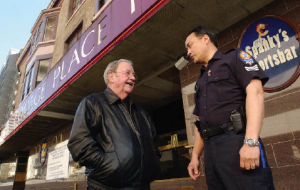
How many liquor seats does the city need?
New Westminster ranks as the booze capital of the Lower Mainland with more liquor seats per capita than anywhere else.
New Westminster, with a population of 62,207 (according to BCStats 2007 estimate), has 11,597 liquor seats. That includes 5,934 at the Starlight Casino, but doesn’t include restaurants serving alcohol.
By comparison, Burnaby’s population is 216,336 and it has 19,316 liquor seats (including 5,845 assigned to Swangard Stadium and 3,550 for Bill Copeland Sports Centre). Neighbouring Coquitlam has 11,025 seats for 120,512 residents.
If you do the math, New Westminster has one liquor seat for every 5.36 residents, while there are 10.93 Coquitlam residents for each liquor seat and Burnaby’s ratio is 11.2 for each resident.
Those numbers make New West councillor Bob Osterman cringe.
“My goal is to reduce drinking seats,” said Osterman when asked what he thinks of the city’s high number of liquor seats.
“To me, liquor has been the bane of our existence. It’s created community conflict, it’s created noise. It’s given us a really bad image.
“My long term goal is to have the average number of drinking seats equal that of our neighbours Burnaby and Coquitlam—so we’re not higher and we’re not drastically lower.”
New Westminster’s high number of liquor seats and licences relates to the city’s economic past, said Osterman. Historically, there was a large number of blue collar and industrial jobs here, and pub and bar owners set up in the city to cater to that demand.
But demographics have changed and those jobs moved elsewhere.
Today, instead of catering to workers wanting a beer after a hard day’s work, the availability of liquor seats makes New Westminster a destination for those looking for a night out, similar to Vancouver’s Granville Street.
And that modern trend makes it in the city’s interests to reduce those seats, said Osterman.
Liquor establishments—especially night clubs—require lots of police resources.
An example is the now-closed College Place Hotel—which housed Chicago Tonite and Mugs and Jugs—which required an average of 20 calls for service a month from New Westminster Police. And that doesn’t even include all of the drive bys by police at closing time, said Staff Sgt. Ivan Chu.
Another reason to have fewer seats is community image and livability, he added.
“It’s for the social values of the city,” Chu said. “We don’t need to be the overall host for young people whooping it up on a Friday or Saturday night.
“We’ve seen trouble, we’ve seen fights, we’ve seen gun play—we don’t need it. We’re beyond that now, we’re a very urban community.”
Osterman is optimistic the number of seats are on the decline.
Some local liquor establishments are renovating and becoming community-based operations like small neighbourhood pubs—catering themselves to their customers.
Liquor licence owner Al Arbuthnot is one of those. He recently bought both of the College Place Hotel licences, and says he’ll significantly reduce the number of seats when they reopen at different locations. Chicago Tonite had 235 seats and he’ll reduce that to about 125 when it reopens as a neighbourhood pub.
It makes good business sense, said Arbuthnot. The smaller, more intimate establishments don’t attract as many problems requiring bouncers or police. You also don’t have to bring in nightly entertainment such as bands or exotic dancers.
Council’s role in the future will be to make sure the city attracts the right kind of establishments, said Osterman.
“The first thing you have to look at is, is the community over-served by alcohol,” he said.
Council must take a good look at the location to make sure it fits in with the community, while questioning the pub owner to make sure they are sensitive to the neighbourhood and community values, Osterman added.
• A public hearing for liquor licence relocation will be held this Monday (7 p.m.) in city council chambers. Businessman Nirmal Walia hopes to transfer his 170-seat Windsor Hotel liquor licence to a location on 12th Street. He plans to change it to a 125-seat neighbourhood pub.
mmcquillan@burnabynewsleader.com
